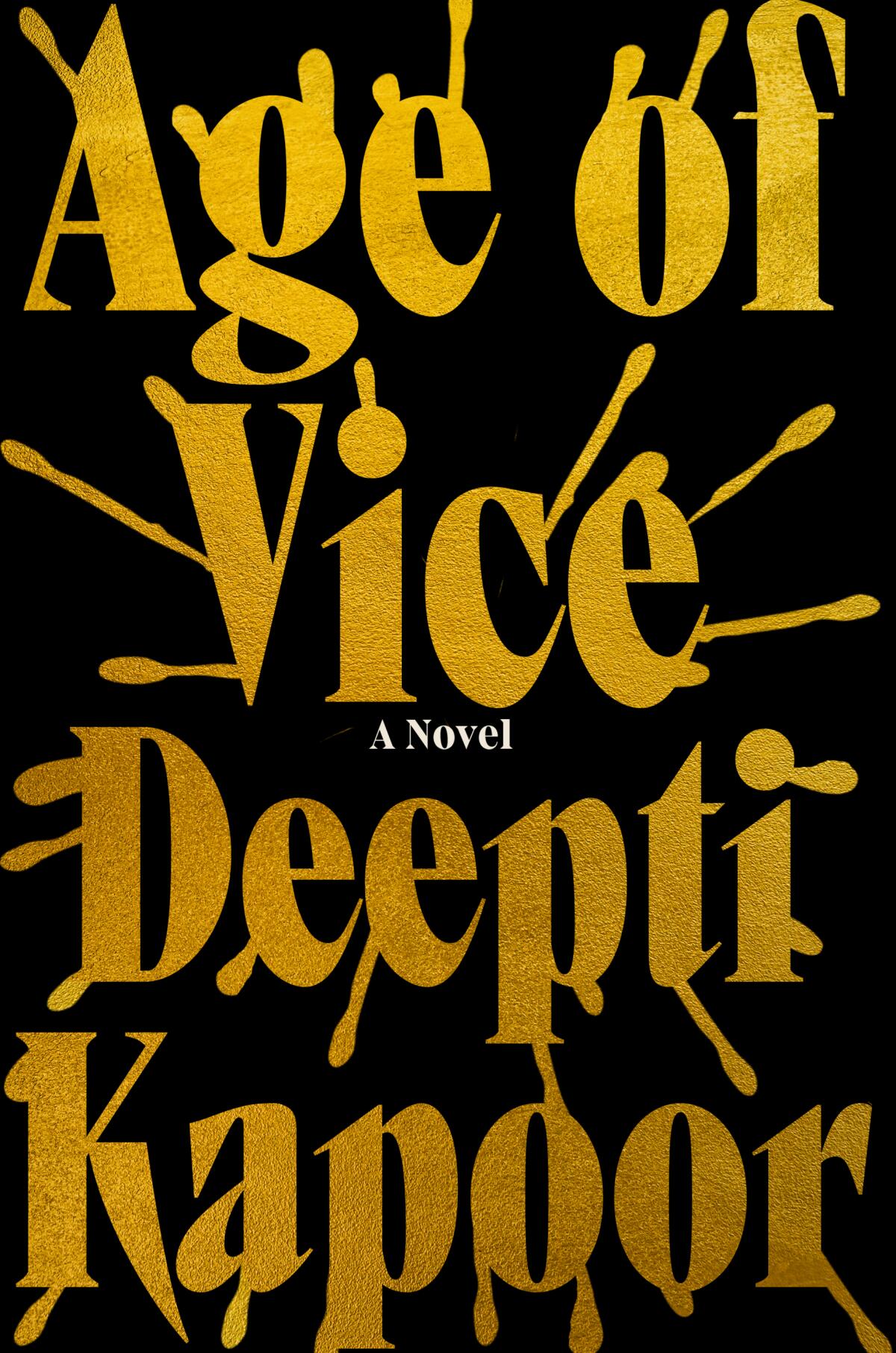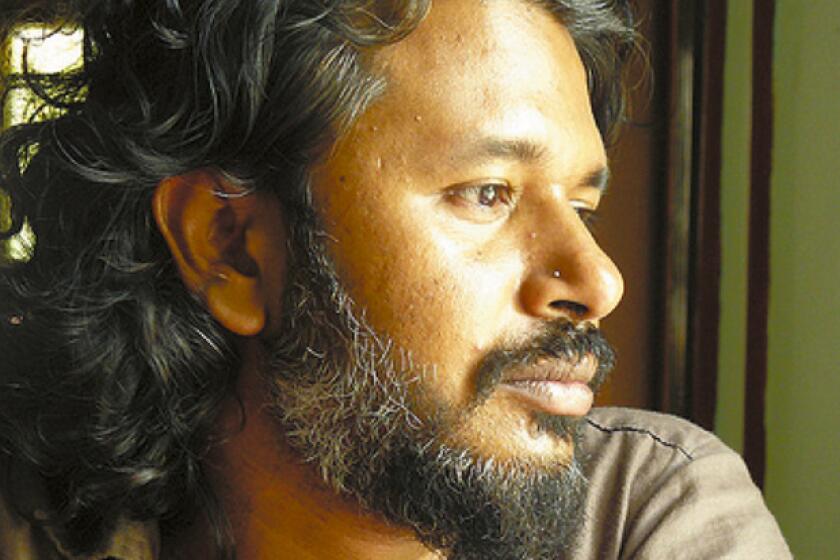A hot new Indian gangster novel thrills and dazzles. It could have done so much more

- Share via
On the Shelf
Age of Vice
By Deepti Kapoor
Riverhead: 560 pages, $30
If you buy books linked on our site, The Times may earn a commission from Bookshop.org, whose fees support independent bookstores.
“Age of Vice,” Deepti Kapoor’s gangster epic about a Delhi crime family, has been touted as a next-generation Indian take on “The Godfather,” snapped up by FX for a series and heralded as the start of a trilogy. Just as notable but rarely noted: Kapoor’s novel is also a sprawling, ambitious work of social realism, in which the culture and conditions of modern Delhi contextualize the rise of the Wadia family crime syndicate. It’s a riveting spectacle, but the balance between Kapoor’s two imperatives — gangster epic and social novel — feels off-kilter.
The gangster part feels familiar enough (in fact, too much so): the clashes among fathers and sons, the desire for legitimacy as a powerful family, the outsider woman in love with a man who can never measure up to her idealized vision. The Wadias’ view of themselves is as modern Robin Hoods: They’ve learned to manipulate the system to beat the wealthy and the powerful at their own game, the better to redistribute the spoils. But the reality is that they merely perpetuate the exploittion. As one newspaper editor puts it, these men “are heroes to the people from whom they steal, whose very lives they destroy.”
It’s clear that with her second novel Kapoor intends to spelunk the huge fissures of wealth and class that make 21st century capitalism feel as brutal as that of the Gilded Age, the more so for being a more recent export to the subcontinent. In a rapidly growing India, the excesses of the wealthy in a sea of poor folks with no access to power feels obscene, and Kapoor sets out to show that, opening with a scene that brings rich and poor together in a jarring crash.
Thrity Umrigar talks about writing her ninth novel, “Honor,” about ethnic conflict and fundamentalism in India, during a populist uprising in the U.S.
A Mercedes careens into a group of sleeping “pavement dwellers.” Five of them, including a pregnant woman, are killed. But when police arrive, they find Ajay, the manservant of Sunny Wadia, drunk and alone behind the wheel. Kapoor first presents the world through the eyes of Ajay as he negotiates a brutal prison system.
When Ajay’s father died, his mother sold him off to work at a guesthouse in the mountains. There, he encountered foreign tourists and India’s wealthy, including Sunny and his journalist girlfriend, Neda.

Ajay’s story is the emotional center of the novel, holding a mirror to Sunny and Neda. He begins his life not only in the deprivation of rural Uttar Pradesh, but also in a caste of people deemed unacceptable. Guilt over his father’s death is part of what drives him to make himself indispensable to Sunny, a courtier currying a prince’s favor. Being obsequious is a means to his own end: finding his mother and avenging his father.
Sunny, heir to his father’s gangster empire, wants to invest his family’s ill-gotten wealth in legitimate enterprises. Neda is a junior reporter whose well-educated boss schools her in the multiple forces at work in a Delhi powered by the labor of the poor. Neda thinks writing a profile of Sunny will expose him, but she’s also driven by her own hunger for legitimacy and status.
Yet Kapoor struggles to prick the conscience of the reader, in part because Ajay is an observer who offers little insight. He becomes Echo to Sunny’s Narcissus. In detailing the gaudy excesses of the rich — the designer labels, the expensive liquors, the furnishings, the lush travel — Kapoor only enhances their fetishistic status. The glitz feels aspirational rather than cautionary, despite the author’s clear disdain. Neda, initially seduced by Sunny, comes to see him as a personification of India’s modern moral universe, an embodiment of the country’s decline over the three decades covered by the novel.
Namrata Poddar’s fragmented debut novel, ‘Border Less,’ features a world in which culture and people travel fluidly between Mumbai and Los Angeles.
Witnessing the horrific death of a child in the course of slum clearance traumatizes Neda, but Sunny sees it as a PR problem. Working in his favor is a power structure bent on clearing the slums from cultural memory and a rising middle class happy to oblige.
“The evictions in the city kept up pace,” writes Kapoor. “The newspapers heralded the transformation of the urban space. The poor were no longer victims of an incompetent and corrupt state. They were encroachers and thieves. Their misery was not the misery of lives. As human beings they were being erased.”
Neda is thrilled by the opportunity to write stories with social impact, but only in leaving India will she become aware that her work has been co-opted by the status quo — just as the Robin Hoods she’s writing about now serve the exploitative establishment. Her growing entanglement in Sunny’s world is further proof that they are both merely passive players at best.
“Passivity is normal — most people suffer from it,” Neda narrates. “They watch the woman being beaten in the street. They watch the accident from the car window. They’re frozen, expecting someone else to intervene. I’m the same. Only I’ll go and stand right next to the beating and take notes. Remember this … Write it down. Remember the light ... it’s my privilege to observe the futility of life.”
In centering the story of the Wadia crime syndicate, Kapoor aims to cast a light on the ways capitalism has corrupted the heroic values taught by the Sanskrit epics. “Covetousness and avarice” trump whatever wisdom we gain in our short lives. Meanwhile, one of the major institutions charged with alleviating poverty — the Indian government — is largely absent from Kapoor’s novel. I saw this elision as a form of commentary on a right-wing government that distracts attention from its failures with demagogic appeals to religion and tribe.
Shehan Karunatilaka saw his native Sri Lanka erupt this May; then he saw his sweeping novel, ‘The Seven Moons of Maali Almeida,’ win the Booker Prize.
For the record:
10:49 a.m. Jan. 4, 2023An earlier version of this article referred to Rohinton Mistry as her. Mistry is male.
The gangster tale, alas, is universal, in part because it’s a lot of fun but also because it’s true. India, like other capitalist states, has turned its back on any notion of seeking the common good for all. But there is more to the story than the lives of the criminals and those in their immediate orbit. It may well be that Kapoor sought to strike the kind of “fine balance” achieved by Rohinton Mistry in his masterful 1996 epic of that title, with its intimate portraits of India in all its contradictions. But this author’s facility with glitz, action and flash tips the scales in the wrong direction.
Berry writes for a number of publications and tweets @BerryFLW.
More to Read
Sign up for our Book Club newsletter
Get the latest news, events and more from the Los Angeles Times Book Club, and help us get L.A. reading and talking.
You may occasionally receive promotional content from the Los Angeles Times.










